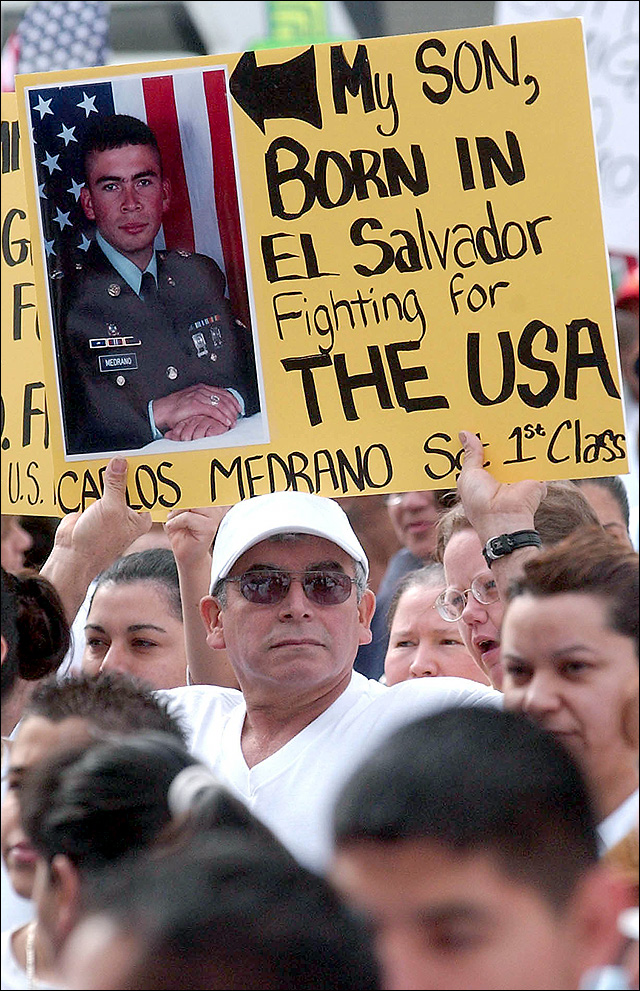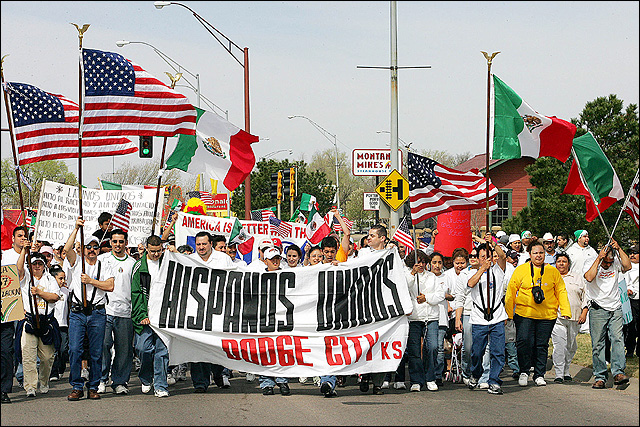Hispanics in Kansas join others across U.S.
Demonstrations occur in dozens of cities

Tereso Medrano holds up a sign showing a photo of his son, U.S. Army Sgt. 1st Class Carlos Medrano, Monday, April 10, 2006, at an immigration rally at Stevens Park in Garden City, Kan. Approximately 3,000 area residents attended the event.
Wichita ? Thousands of Hispanics across Kansas closed their businesses, walked off jobs and skipped classes Monday to demonstrate in support of immigration rights.
They joined hundreds of thousands of people – in dozens of cities from New York to San Diego – who took to the streets demanding U.S. citizenship for illegal immigrants, in some of the most widespread demonstrations since the mass protests began across the country two weeks ago.
“We love this country. This country gives to us everything,” said Florentino Cruz, 32, an illegal worker from Mexico who has been in the United States since 1992. “This country was made by immigrants.”
The protesters have been urging lawmakers to help an estimated 11 million illegal immigrants settle legally in the United States. A bill passed by the House would crack down on illegal immigrants and strengthen the nation’s border with Mexico. A broader overhaul of immigration law stalled in the Senate last week.
The impacts in Kansas were felt most at some meatpacking plants, where Hispanic workers comprise much of the work force.
Excel Corp., the nation’s second largest beef processor, said Monday the company noticed a slowdown in production at its plants in Dodge City and Schuyler, Neb., because of immigration rallies in those cities. The company declined to disclose exact attendance figures at those two plants but said its other plants were unaffected.
“I wouldn’t want to say how much production has been slowed, but it has been slowed. Definitely,” said Excel spokesman Mark Klein.
Related Content
- 6News video: Lawrence protesters demand fair treatment of immigrants
- Immigrants take to streets, make case for citizenship
- Hispanics in Kansas join others across U.S.
- Daschle says America must use own people as model
- Hispanic
leader advocates balance in immigration reform (4-10-06)
- Brownback’s
stance may be liability (04-10-06)
- Thousands
rally for immigrant rights (04-10-06)
- Status
of aliens rising as national concern (04-10-06)
- Congressional
briefing: Brownback: Farmers need migrant workers, bigger subsidies
(04-05-06)
- 6News
video: Brownback calls for serious immigration law changes
(04-05-06)
- “Border Protection, Antiterrorism, and Illegal Immigra-tion Control
Act of 2005.”
The company planned to take no adverse action against its workers.
“We assume they will be back at work tomorrow,” Klein said.
In Garden City, a morning rally brought out an estimated 3,000 people, making their voices heard as Congress considers immigration reforms. Signs demanded an end to racism and discrimination, and some showed pictures of uniformed Hispanic military personnel.
About 20 percent of the students in Garden City schools were absent from classes Monday to attend the rally in that city, far above the 4 percent normal absentee rate, said Roy Cessna, spokesman for the district. About 60 percent of the more than 7,300 students in Garden City’s public schools are Hispanic.
National scene
Monday’s demonstrations followed a weekend of rallies in 10 states that drew up to 500,000 people in Dallas and tens of thousands elsewhere. Dozens of other rallies, many organized by Spanish-language radio announcers, have taken place nationwide during the past two weeks, including one with more than 500,000 people in Los Angeles.
In the nation’s capital, thousands of immigrants, their families and supporters marched Monday from Hispanic neighborhoods past the White House, then converged on the National Mall.

A group of people march Monday morning, April 10, 2006, in Dodge City, Kan., in support of immigrant's rights. Demonstrators took to the streets across the United States in support of an estimated 11 million illegal immigrants and legislation that could give them legal residence in the country.
Peter Lanteri, director of New York’s chapter of the Minutemen, a volunteer border watch group, said he thought it was “ridiculous” that illegal immigrants were protesting for their rights.
“Illegal is illegal, and they break our laws to come here,” Lanteri said by telephone. “We want the illegal immigration stopped and the borders secured.”
Maria Santiago, 53, an outreach coordinator for a nonprofit health clinic in Harrisburg, Pa., said she sees many illegal immigrants seeking access to health care.
“These are people that are willing to take any job, clean bathrooms, scrub floors for a measly penny so that they have an opportunity to live in this country … and yet we want to send them back because they want a better life?” Santiago said.







